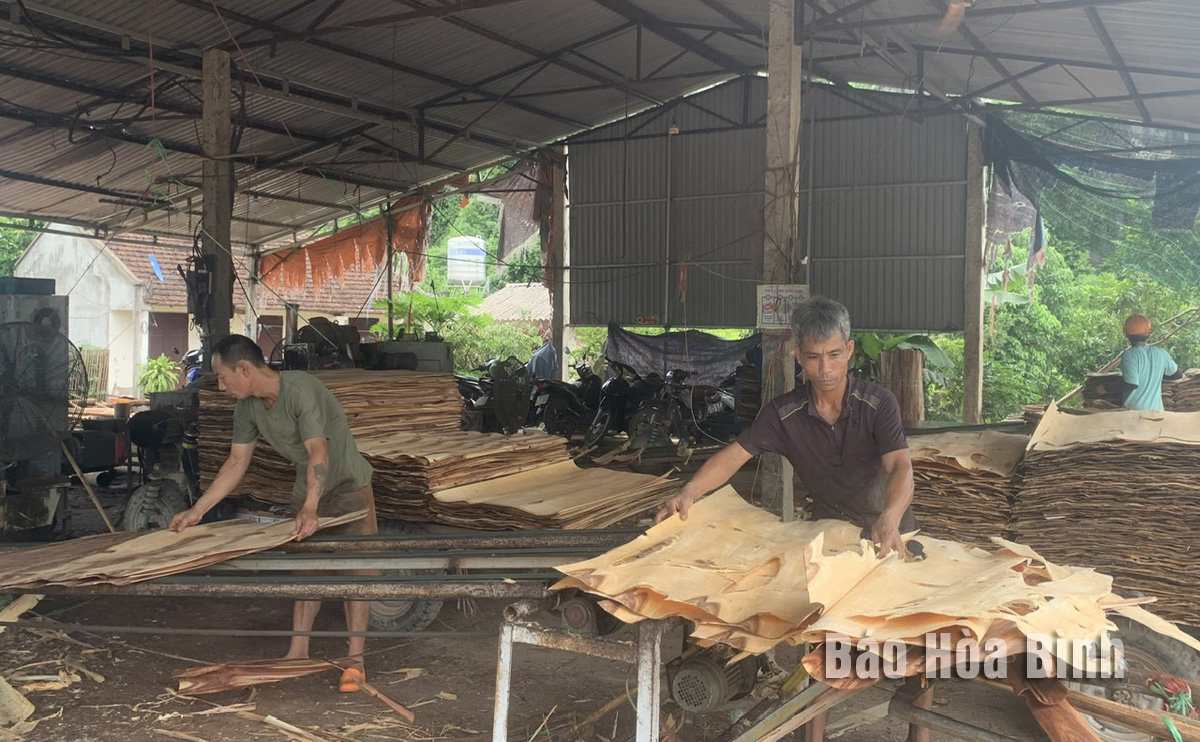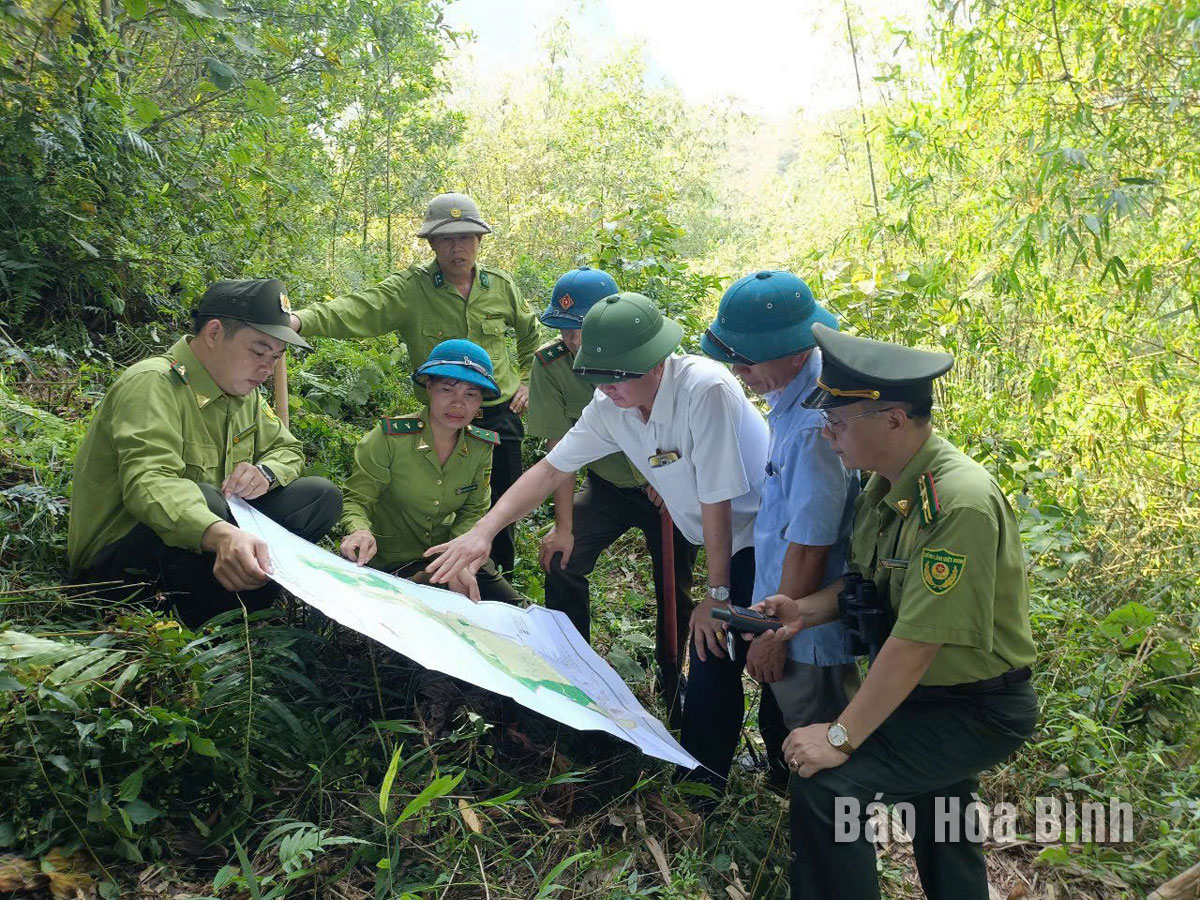
With a large natural forest area and wide forest coverage, Hoa Binh province boasts considerable potential and advantages for developing forest-based economic activities. This is also an appropriate direction for building a sustainable and environmentally-friendly economy.
Lac Thuy district currently accommodates many "keo
lai” (Acacia hybrid) processing workshops which have helped raise the economic
value of planted forests. (Photo taken in An Binh commune).
Forest rangers of Hoa Binh province
and Cao Phong district on patrol in Thach Yen commune.
With the province’s forest coverage of more than
51%, forest not only serves as a "lung” but also plays a significant role in
protecting the environment, guaranteeing water and energy security, preventing
and controlling floods, and ensuring safety for the Red River Delta, including
Hanoi capital. It creates challenges as well as major advantages for the local
economy, culture, and society to develop fast and sustainably.
Over the past years, all-level Party committees
and administrations have identified protecting and sustainably developing
forest as one of the strategic tasks. To do that, Hoa Binh has worked to
fruitfully carry out the Government’s support policies.
The province has properly made payments for
forest environmental services, thus substantially contributing to
socio-economic development. Thanks to the payments, the persons in charge of
forest protection and development gain another source of income while forest
owners and managing units have more funding for forest and infrastructure
development.
At present, 116,037ha of local forest are
entitled to payments for forest environmental services which were valued at
over 21.5 billion VND (845,900 USD) in 2023.
In particular, to help improve the productivity
and quality of production forest, Hoa Binh is implementing a project on forest
protection and development at a total cost of 127.6 billion VND.
Nguyen Huu Tai, head of the province’s forest
protection division, said thanks to the effective implementation of support
mechanisms and policies, Hoa Binh has basically managed to maintain the natural
forest area and expand the cultivated one.
The area zoned for forestry now spans about
294,183ha, 236,919ha of which are under forest (comprising 141,614 ha of
natural forest and 95,305ha of planted forest).
Covering 51.61% of Hoa Binh’s area, forest is
present in 149 communes, wards, and townships of 10 district-level localities.
The protected area has contributed to effective forest-based economic growth.
Tai said there are about 16,000ha of planted
forest granted the Forest Stewardship Council (FSC) certificates.
In Resolution No. 27-NQ/TU, dated July 30, 2020,
of the provincial Party Committee’s Standing Board, Hoa Binh targets 50% and
over 80% of the cultivated production forest area granted the FSC certificates
by 2025 and 2030, respectively.
To that end, it is boosting the dissemination of
the State’s regulations on building and implementing sustainable forest
management plans, making assessment of and maintaining the eligibility for the
FSC certificates, and encouraging businesses holding economic and technical
strengths to coordinate with forest owners to apply for the certificates, he
added.
Hoa Binh province is undergoing a dynamic transformation amid Vietnam’s national digital transition. Building on Poliburo’s Resolution No. 57-NQ/TW on breakthroughs in science, technology, innovation, and national digital transformation, the province has rolled out a wide range of practical action plans. A standout initiative is the "Digital Literacy for All” movement, an effort to ensure that no one is left behind in the digital era.
Hoa Binh province is undergoing a dynamic transformation in the wake of the national digital transformation movement. Building on Resolution No. 57-NQ/TW of the Politburo on breakthroughs in science, technology, innovation, and national digital transformation, the province has implemented a wide range of practical action plans. A standout initiative is the "Digital Literacy for All” movement ambitious effort to ensure that no one is left behind in the digital age.
With a spirit of unity and proactive problem-solving, the Party Committee, the government and the people of Dong Lai Commune (Tan Lac District) have made great strides in implementing the resolutions of the 24th Party Congress of the commune for the 2020 - 2025 term. Focusing on leadership and practical actions, the commune has brought the Party’s resolutions into daily life, creating strong impacts and pushing the local development forward.
Amid the nationwide push for digital transformation, young people in Hoa Binh Province are stepping up as dynamic pioneers, applying technology to enhance Youth Union operations and expand the reach of youth-led initiatives. Through creativity and adaptability, Youth Union organizations at all levels have introduced a series of practical solutions, contributing to modern governance and community development.
In recent years, An Nghia commune, located in Lac Son district, has stepped up administrative reform, focusing on improving the quality and efficiency of its single-window service unit for receiving and processing administrative procedures. These improvements have helped create favourable conditions for local residents and organisations to handle administrative procedures, contributing to the commune’s broader socio-economic development.
The Prime Minister-approved master plan to develop the multi-use value of forests ecosystems through 2030, with a vision to 2050, aims to improve the management and sustainable use of forest resources, create jobs, increase incomes, and improve the living standards of ethnic minorities, people in mountainous and remote areas, forest workers and those living near forests.




